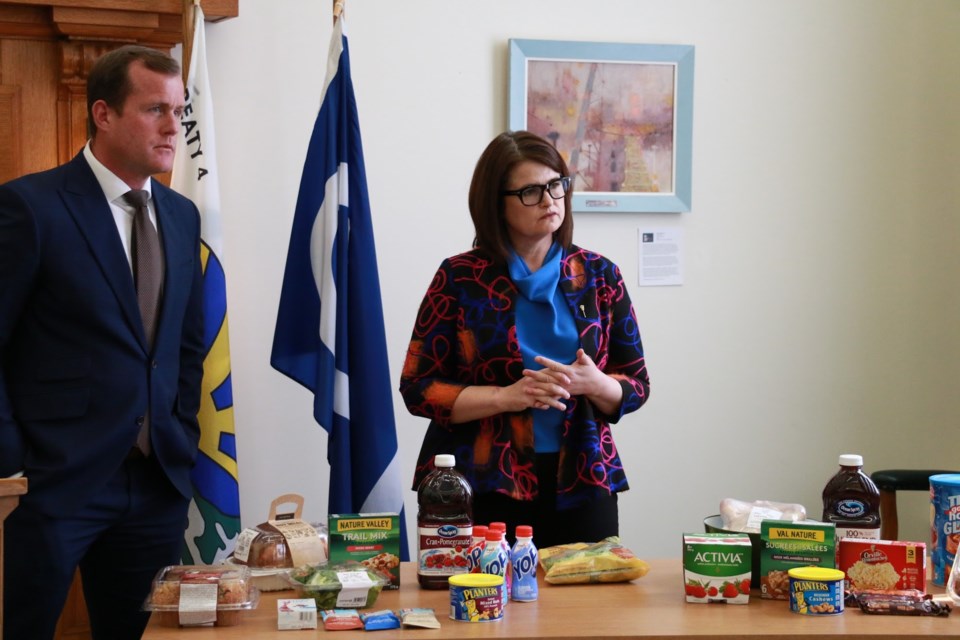REGINA - Tuesday was Snack Day at the legislature.
The opposition New Democrats took aim at the PST on snack foods that day, dubbing it the “Sask Party Snack Tax.” Opposition Leader Carla Beck and Opposition Critic Trent Wotherspoon called a news conference that had on hand plenty of snacks impacted by the tax.
The NDP noted certain food items classified as snacks and snack-sized, including in packages of five or less. As the MLAs pointed out, the PST even impacted health foods such as muffins granola bars, yogurt drinks, ready made salad and even rotisserie chicken.
“We’re not just talking about junk food here,” said Beck at the news conference. “These are groceries and these are essentials that people rely on just to get by. And they should not be taxed, period.”
The Opposition called on the government to remove that tax which came in in 2017. In Question Period Tuesday, Finance Minister Donna Harpauer responded to the opposition on the issue. That exchange is recorded in Hansard.
Hon. Ms. Harpauer: — “Mr. Speaker, it’s interesting that they still want to debate a budget from six years ago and there’s been an election since then. But however, Mr. Speaker, I fully recognize that the cost of food is inflated right now and that is a pressure on families.
“So when the decision was made in the 2017 budget — and there’s a number of reasons that we have stated in this House as to why we made those difficult decisions — we used the federal government definition on what is snack food. That then helps with the retailers, confusion among the retailers. So it’s the same definition on what qualifies as snack food that the federal government use, supported by the members opposite. Quite frankly, it is their leader Jagmeet Singh that’s keeping the federal government in power.
“Other provinces that have harmonized tax, and by the way the PST component of that harmonized tax is more than our PST . . . is also applied to those same criteria, list.”
Ms. Beck: — “So I guess they’re hauling water for the feds now, Mr. Speaker. But there’s no reason, there’s frankly no reason to be charging this tax on groceries, especially while they sit on windfall revenue and especially while families, seniors in this province are facing a generational cost-of-living crisis, Mr. Speaker. But for a minister who shows an I-don’t-care attitude after an $8,000 flight that should’ve been a four-hour car ride, perhaps that shouldn’t be surprising…”
Hon. Ms. Harpauer: — “Mr. Speaker, again I’m going to say it is to help the retailers with confusion. We use the same definition that the federal government uses as to what qualifies to be snack food. So we’re not carrying the water for the federal government; we’re helping for the confusion with the retailers, Mr. Speaker.”
Wotherspoon also attacked the government on the issue, bringing up the choice of foods on the list to be nailed with the PST.
Mr. Wotherspoon: — “Mr. Speaker, tell me you’re out of touch without telling me you’re out of touch…
“An uncooked chicken, well it’s not taxed. But a cooked rotisserie chicken, it’s taxed, Mr. Speaker. Why is the Finance minister forcing families to pay PST on basic groceries like hot rotisserie chickens?”
Hon. Ms. Harpauer: — “Mr. Speaker, in going back to decisions that were made six years ago, it’s a bit of a stretch that they have found . . . And yes, there are some odd foods that are on the list that the federal government has. The majority of foods are chips, chocolate bars, candies. They are like genuinely what we would think of as snack food. However to save confusion with the retailers, we use the same criteria so that there is no question as to what the PST qualifies and what doesn’t.
“What I do find interesting, and if anyone has time to go through Hansard of committee where my budget was scrutinized by that member opposite, you will find that the members opposite, in all of their asks of additional spending, it adds up to $1.5 billion, Mr. Speaker. Heaven help us if they are ever in charge of the finances of this province.”
In speaking to reporters afterwards, Harpauer reiterated that using the federal definition on snack foods was meant to provide clarity to the grocery stores on what would be taxed. As for why they had brought in that PST to begin with, she said it was to “find ways to generate revenues so that we could continue with increases to health care, education, social safety nets.”
“It did stabilize that base in our budget so we did not have to rely on that volatile resource revenue,” said Harpauer.
The finance minister did leave open the door the possibility of perhaps reducing the PST in next year’s budget, saying to reporters she would “like to lower the PST, period.”
As for whether that will actually happen, Harpauer indicated that will depend on the revenue situation. “Let’s see how we do,” she said.
When asked if the day might come when Saskatchewan might get to a point where they might do away with the sales tax like Alberta, Harpauer replied “I can only dream.”





